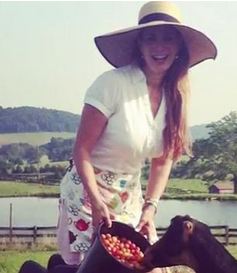by James A. Bacon
In August 2012, Martha Boneta held a birthday party for eight girls on her Fauquier County farm. After an ensuing altercation with local authorities over permissable land uses on her property, including the hosting of events and the sale of farm products and home crafts, she filed suit against the county. The story made it onto FOX News, a variety of property rights groups took up her cause and now Del. Scott Lingamfelter, R-Woodbridge, has introduced the “Boneta Bill” (HB 1430) to limit property rights infringements by government.
The controversy raises important issues about rural property rights, and the Boneta Bill, which would modify the Right to Farm Act (VRFA), could have sweeping ramifications on the power of Virginia counties to regulate commercial activity on farms.
Said Lingamfelter in a press release:
Property rights are one of the most fundamental rights in a free society. In the United States, we the people are the sovereign. We the people have the right to farm just as our Founders envisioned with what they called the pursuit of happiness. …
House Bill 1430 will strengthen the VRFA and ensure that the heritage and traditions of farming in the Commonwealth of Virginia are respected at all levels of government. By amending the defining section of the VRFA to include the byproducts of farm produce and the sale of items incidental to farming, House Bill 1430 ensures that government officials cannot take action to restrict or prevent the citizens from engaging in commerce. The bill also expressly sets forth that any county ordinance is void if it were to violate constitutional rights on agricultural property, such as speech, assembly, religion, and other freedoms protected by the Bill of Rights.
Foes of the bill are concerned that, if it passes, there would be nothing to prevent a farm anywhere from becoming a flea market. It would pit farmers who have larger retail operations on their property against farmers who just want to farm — and against homeowners who purchased property in the country “just to get away from it all.” Furthermore, my source says, the bill could have unintended consequences, potentially affecting the ability of local governments to regulate a noisy and visible activity like oyster farming in residential neighborhoods, as two oyster farmers embroiled in litigation with York County, have engaged in.
Boneta owns “Paris Barns,” a small, historic working farm in Fauquier, that produces seasonal vegetables, herbs, honey, eggs, hand-made soaps and wool crafts. Boneta’s friends and allies claim that these activities, as well as the birthday party, ran afoul of local land use regulations. States Lingamfelter’s press release:
County government officials informed Martha that local ordinances required a permit to be obtained prior to hosting such an event and that she would be fined $5,000 for doing so. Martha was also charged with two additional violations with up to $5,000 fines apiece – one for advertising a pumpkin carving and another for operating a small shop on her property that Martha used to sell her fresh produce and handmade crafts. County officials made these claims and levied fines without ever stepping foot on her property to actually see her operations.
County officials dispute the accuracy of that account. A press release issued by the Fauquier County Board of Supervisors responds that (1) the county has not yet levied any fines, (2) Boneta was never cited for selling her own farm products but for selling produce and crafts produced off-site, and (3) Boneta was never cited for hosting a birthday party but for “representing that her farm was available for, a variety of activities including parties, classes, festivals and other events.” Fauquier officials insist that its code does not infringe upon farmers’ rights to sell their own produce or to provide “tours” of their farms.
The Fauquier County press release concedes that if Boneta does not comply with the zoning ordinance, “additional actions would be taken to include legal actions or fines up to $5,000,” and it does not dispute that she has shut down her commercial operations.
This issue should be a hot one. In November, 74% of Virginians voted for an amendment that would strengthen property rights. The Boneta Bill has strong populist appeal. But local governments worry that the bill would restrict their ability to regulate conflicting land uses in rural areas. Lingamfelter has scheduled a press conference that could well turn into a media circus. The event will be attended by constitutional lawyer Mark Fitzgibbons, co-author of “The Law that Governs Government,” and organic farmer Joel Salatin, author of “Everything I Want to Do Is Illegal: War Stories from the Local Food Front.” Stay tuned…



